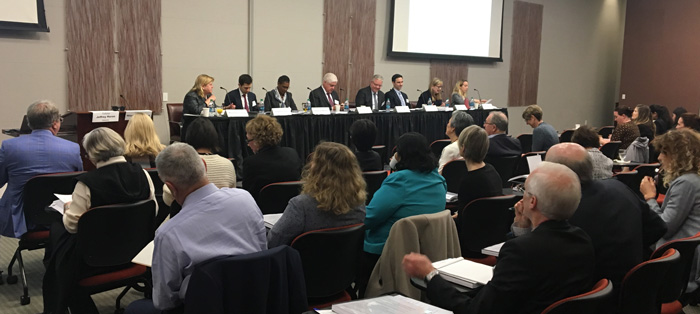By Linda Wagner, FWSF VP, MarComm
Nearly 200 interested people attended this annual industry leadership event on March 12, held once again at the Federal Reserve Bank of Francisco. Financial Women of San Francisco (FWSF) co-hosted with the San Francisco Bank Attorneys Association and the Financial Institutions Committee of the California Lawyers Association.

A panel of distinguished financial services experts discussed legal, regulatory and technology developments impacting the financial services industry, fintech charters, cybersecurity challenges, new developments in payments, outlook on regulatory tailoring, and more. Attendees included a mix of financial services attorneys, bankers and fintech executives, compliance and risk officers, and interested members of the legal and business community. Networking before the event and during the break provided a chance to exchange perspectives on the topics covered and to make new connections.
Stephen Salley, partner, Sullivan & Cromwell LLP, began the program with a review of the financial services regulatory reform legislation, the potential for additional mergers and acquisitions, the Office of the Comptroller of the Currency (OCC) proposal to reform the Community Reinvestment Act, brokered deposits and the Volcker Rule.
Deborah Bailey, managing director, KPMG, addressed the key regulatory challenges of 2019: 1) divergent regulation, 2) risk governance and controls, 3) data privacy, 4) compliance processes, 5) credit management, 6) cybersecurity, 7) ethics and conduct, 8) consumer protections, 9) financial crimes, and 10) capital and liquidity. She explained how regulators will assess how firms are adapting to market pressures and managing the associated risk, focusing on firms’ operational resilience, governance and controls, data security, and consumer protections — and expecting all to align with ethical and sound conduct practices.
Michael Flynn, partner, Goodwin Procter LLP, was next with a presentation on possible reform of Freddie Mac and Fannie Mae, and changes at the Consumer Financial Protection Bureau (CFPB). There are wide disagreements on how reform should look, but general agreement on several issues that need to be addressed. There are several possible approaches to reform, as well as many key players and constituencies. The CFPB has shifted its emphasis on some issues, pursuing fewer enforcement actions, but continuing with exams.
William Ward, executive vice president, chief BSA/AML & Security Officer, First Republic Bank, spoke on cybersecurity and the primary methods used by fraudsters, including email scams, financial malware, ransomware and technical support scams.
Sebastian Astrada, director of applications, Federal Reserve Bank of San Francisco, presented Tale of Two Filers. These two types are nonbank fintech filers and bank fintech filers. The decision-making process involves fundamentally the same analysis — which laws and regulations apply to you, what filings are required, and what risk do you accept, reduce, transfer and/or avoid.
Cynthia Holbrook, assistant general counsel, Federal Reserve Bank of San Francisco, discussed the Fed’s role in supporting a faster payments system and her work on the Fed’s U.S. Path to Faster Payments Task Force.
Kristin Hall Devenica, vice president and senior counsel, Wells Fargo Legal Department, concluded the day’s program with a discussion of The Clearing House’s RTP® (Real Time Payments) Network and other faster payments initiatives, such as Zelle.
Many thanks to FWSF board member Maureen Young, senior vice president and senior regulatory counsel, Bank of the West, for working with her colleagues, Jeffrey Huron, member at Dykema Gossett PPLC, chair of the Financial Institutions Committee of the California Lawyers Association and Hilary Gevondyan, senior vice president and associate general counsel, First Republic Bank and president of the San Francisco Bank Attorneys Association, for providing a program that contained such rich content. This program continues to be one of the highlights of the year for anyone involved in financial services regulatory compliance. We also want to thank the Federal Reserve Bank San Francisco for hosting this event.
************
FWSF has other exciting events coming up, check out our Events Calendar.
Also, we are always looking for attendees who want to provide a summary of the event. If you volunteer, you can attend free of charge. Contact Marianne LaPorte, co-chair of MarComm, if interested: mariannepri@hotmail.com.